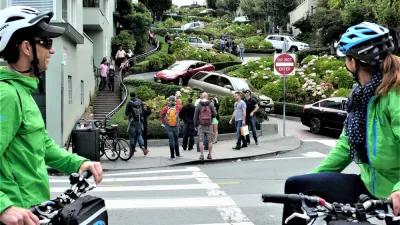If Gov. Gavin Newsom signs legislation by San Francisco Assemblyman Phil Ting, motorists who want to drive the 'world's most crooked street,' a huge tourist draw, will be forced to participate in a pilot 'reservation and pricing program.'

While not exactly 'Manhattan-style congestion pricing,' where drivers headed south of 60th Street will be subject to a hefty toll come January 2021, the Lombard Street 'reservation fee' had to clear the same legislative hurdle, as the state Assembly press release (source article) indicates.
The bill by Assemblymember Phil Ting (D-San Francisco) is necessary because existing law prohibits a local agency from imposing a tax, permit fee, or other charge for the use of its streets or highways.
The bill, "AB 1605: City and County of San Francisco: Crooked Street Reservation and Pricing Program," passed the Assembly on a 54-23-2 vote on Thursday. Gov. Newsom (D), the city's mayor from 2004 to 2011, has until Oct. 13 to sign or veto it. If he signs, the next step would be in the hands of the Board of Supervisors of the City and County of San Francisco, according to the bill's text:
This bill would authorize the Board of Supervisors of the City and County of San Francisco by ordinance to conduct a reservation and pricing pilot program for vehicles that use the “Crooked Street,” which the bill would define to mean the portion of Lombard Street located between Leavenworth Street and Hyde Street in the City and County of San Francisco.
Before the board of supervisors adopts an ordinance to conduct the pilot program, the bill would require the board of supervisors to make certain findings and to conduct at least 2 public outreach meetings or hearings...
The reservation program would be an all-electronic system, supported by a website, mobile app, and possible on-street kiosks to enable reservations, payments, and user support, according to the Sept. 4 legislative analysis. It states that the "current plan is for a staff [sic] onsite to check reservations, through paper and electronic means, and help direct vehicles, operating from 9:00 a.m. to 9:00 p.m. and cost $5 on weekdays and $10 on weekends and holidays."
Unlike the Manhattan plan and all other cordon pricing schemes being considered by large cities in the U.S., including San Francisco, AB 1605 encountered no formal opposition. Yet pricing streets, even more so than parking, is inherently controversial, explaining why 28 percent of legislators in both chambers opposed the bill.
Other alternatives considered
The seven-year pilot program fits the description of road pricing, a type of tolling, which was one of several considerations to deal with the street congestion, as noted in a September 2016 post on a study conducted by the San Francisco County Transportation Authority:
After a year researching how other tourist destinations handle similar problems, the study is now exploring solutions—including barring cars and turning the area into a pedestrian-only plaza...Other proposals include hiring a mass of parking and safety officers, requiring reservations, and charging a toll.
The fact that a car ban was not selected, yet was considered, is noteworthy. In essence, the authority chose a market-based measure to manage demand over the simpler, but arguably more extreme, ban, which presumably would not have required state legislation.
Assuming the governor signs AB 1405, chalk this pricing initiative up as a win for the Transportation Authority and Assemblyman Ting. The authority's Pricing & Incentives webpage lists three additional, ongoing projects:
- Carpool and express lanes on freeways
- Downtown congestion pricing
- A toll to enter and exit Treasure Island
Additional reading:
- Tourists May Soon Have to Pay to Drive San Francisco’s Lombard Street, Associated Press, Sept. 6, 2019
- Gridlock At The World-Famous “Crooked Street” Prompts Legislation To Soothe Residents' Woes, San Francisco Magazine, Aug. 23, 2019
Related in Planetizen:
-
Crowds of Pedestrians Prompt Lombard Street Study, September 22, 2016
-
SF's Congestion Pricing Plan Advances, November 15, 2010
Hat tip to Nannette Miranda.
FULL STORY: Ting Proposal for Reservation & Pricing System On World Famous Lombard Street Heads to the Governor

Planetizen Federal Action Tracker
A weekly monitor of how Trump’s orders and actions are impacting planners and planning in America.

Map: Where Senate Republicans Want to Sell Your Public Lands
For public land advocates, the Senate Republicans’ proposal to sell millions of acres of public land in the West is “the biggest fight of their careers.”

Restaurant Patios Were a Pandemic Win — Why Were They so Hard to Keep?
Social distancing requirements and changes in travel patterns prompted cities to pilot new uses for street and sidewalk space. Then it got complicated.

California Homeless Arrests, Citations Spike After Ruling
An investigation reveals that anti-homeless actions increased up to 500% after Grants Pass v. Johnson — even in cities claiming no policy change.

Albuquerque Route 66 Motels Become Affordable Housing
A $4 million city fund is incentivizing developers to breathe new life into derelict midcentury motels.

DC Area County Eliminates Bus Fares
Montgomery County joins a growing trend of making transit free.
Urban Design for Planners 1: Software Tools
This six-course series explores essential urban design concepts using open source software and equips planners with the tools they need to participate fully in the urban design process.
Planning for Universal Design
Learn the tools for implementing Universal Design in planning regulations.
Heyer Gruel & Associates PA
JM Goldson LLC
Custer County Colorado
City of Camden Redevelopment Agency
City of Astoria
Transportation Research & Education Center (TREC) at Portland State University
Camden Redevelopment Agency
City of Claremont
Municipality of Princeton (NJ)





























